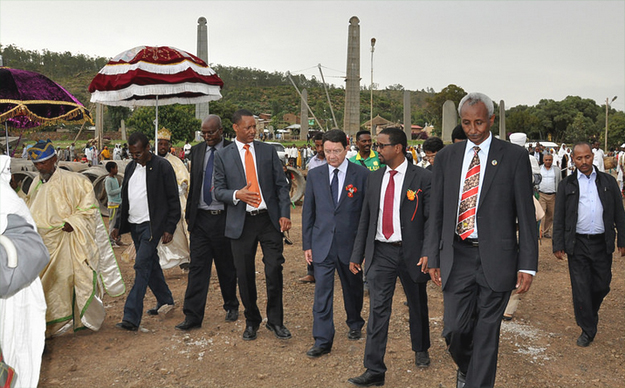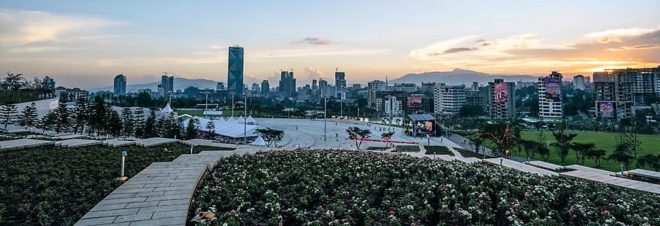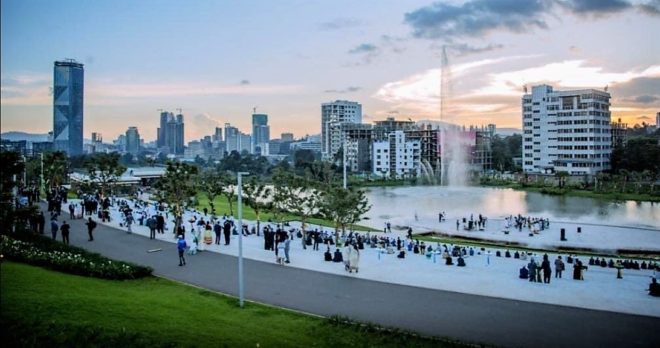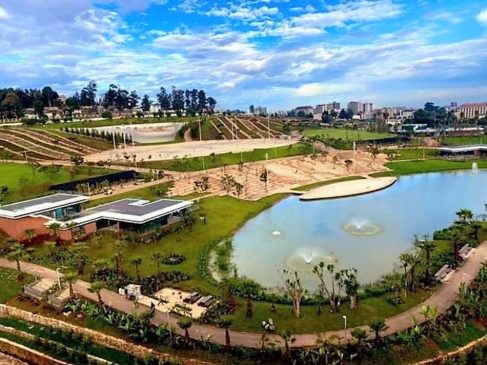Ethiopia – Tourism Key to Promote Development

PRESS RELEASE
Addis Ababa, Ethiopia – During an official visit to Ethiopia, UNWTO Secretary-General, Taleb Rifai, met with President Mulatu Teshome, Prime Minister Hailemariam Desalegn, Deputy Prime Minister Demeke Mekonnen, and Minister of Culture & Tourism,Amin Abdulkadir, to address the advancement of tourism in Ethiopia and the key role of the sector in the country’s socio-economic development. (Addis Abeba, Ethiopia, 13-18 July 2014).
The Government of Ethiopia is currently implementing a number of strategic measures to further develop the country’s tourism sector, including investment in infrastructure and capacity building on destination management and product development, through the recently established Tourism Transformation Council.
These measures reflect how tourism is firmly established among the development drivers of the country, said President Mulatu in a meeting with Mr. Rifai, where he expressed his full support to the tourism sector, and the commitment of the Ethiopian government to make sustainability a priority in future tourism development.
“Ethiopia is endowed with rich historical relics which, combined with the hospitality of our people, make it viable for tourism. The government has lined up abled professionals to work within the industry and there is the right political will in place to contribute towards tourism”, said President Mulatu.
Mr. Rifai commended Ethiopia for the political support awarded to the tourism sector and in particular for integrating tourism as part of its development policy. “Tourism is a key tool to lift people out of poverty and create new opportunities”, he said. “The steps being taken by Ethiopia, namely enhancing the protection and conservation of tourist attractions, expanding the tourism infrastructure, establishing a tourism marketing organization and a national tourism council as well as increasing education and training institutions in the field of tourism, will surely make tourism a pillar of the development of Ethiopia”, he added.
During his official visit, Mr. Rifai also met with Prime Minister Desalegn, who, on the occasion of The High Level Seminar on Tourism Industry, was presented the UNWTO/WTTC Open Letter on Travel and Tourism, calling on Heads of States and Government to “promote the value of the tourism sector in advancing sustainable tourism development”.
“The Tourism Transformation Council aims to build on Ethiopia’s natural, historical and cultural resources to strengthen the tourism sector, identify pressing value-chain gaps and intervening to allay these gaps based on tangible and scientific studies jointly with the private sector and the international tourism community. Together, we will work hand in hand to make tourism one of the leading economic sectors of our country and Ethiopia a top destination in Africa”, said Mr. Desalegn.
UNWTO and Ethiopia have agreed to reinforce their collaboration in the areas of tourism statistics, sustainable tourism development, public-private partnerships and marketing strategies, as defined in an agreement signed by Mr. Rifai and the Minister of Tourism and Culture of Ethiopia, Mr. Amin Abdulkadir.
Note:
Africa has been one of the fastest growing tourism regions of the last decade, totaling 56 million international tourist arrivals last year up from 26 million in 2000. UNWTO forecasts this number to reach 134 million by 2030.
In 2013, tourism generated US$ 34 billion in exports in Africa (7% of all exports in the region) up from US$ 10 billion in 2000.
Useful links:
Photo album: Official visit by UNWTO Secretary-General Taleb Rifai to Ethiopia
UNWTO Regional Programme for Africa
Download and share: Tourism – Driving Trade, Fostering Development and Connecting People
Contacts:
UNWTO Senior Media Officer: Marcelo Risi
Tel: (+34) 91 567 81 60
UNWTO Communications & Publications Programme
Tel: (+34) 91 567 8100 / Fax: +34 91 567 8218



